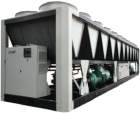Water chillers deliver impressive efficiency

Ciat’s PowerCiat2 range of chiller offers cooling capacities from 610 to 1350 kW and can achieve an ESEER of 411. These chillers use R134a and achieve 7 kW of cooling per kilogram of refrigerant charge, said to be the best figure on the market. A key feature is the combination of micro-channel coils and shell-and-tube dry-expansion evaporator technologies.
The micro-channel coils reduce refrigerant charge by 45% and reduce overall weight and footprint by 20%. The evaporator also reduces refrigerant charge and optimises pressure drops to achieve high energy efficiency.
The screw compressors have continuous regulation using slide control, limiting the number of starts and extending their service life.
The optimisation of the oil-management system and the economiser fitted as standard on each compressor contribute to the energy-optimisation capabilities of these chillers.
There are three noise levels. The quietest version has a sound-pressure level of 63dB(A) at 10 m for the largest model. Features include variable-speed fans on the heat-rejection coils, compressors on anti-vibration mounts and installed inside acoustically insulated boxes, and intake pipes having flexible couplings to prevent the transmission of vibrations.
Controls are optimised for screw compressors and are compatible with a BMS using Modbus, LonWorks and BANnet protocols.
Waste heat can be used to produce DHW at up to 60°C for establishments such as hotels.







